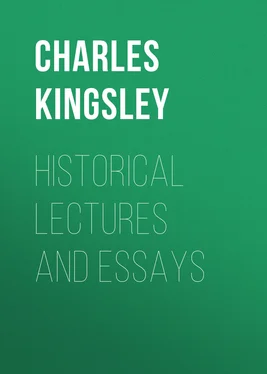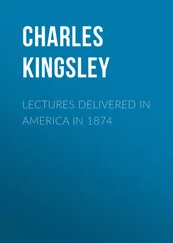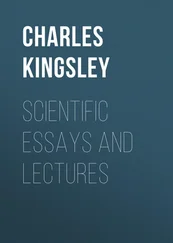Charles Kingsley - Historical Lectures and Essays
Здесь есть возможность читать онлайн «Charles Kingsley - Historical Lectures and Essays» — ознакомительный отрывок электронной книги совершенно бесплатно, а после прочтения отрывка купить полную версию. В некоторых случаях можно слушать аудио, скачать через торрент в формате fb2 и присутствует краткое содержание. Жанр: foreign_prose, История, foreign_edu, foreign_antique, на английском языке. Описание произведения, (предисловие) а так же отзывы посетителей доступны на портале библиотеки ЛибКат.
- Название:Historical Lectures and Essays
- Автор:
- Жанр:
- Год:неизвестен
- ISBN:нет данных
- Рейтинг книги:5 / 5. Голосов: 1
-
Избранное:Добавить в избранное
- Отзывы:
-
Ваша оценка:
- 100
- 1
- 2
- 3
- 4
- 5
Historical Lectures and Essays: краткое содержание, описание и аннотация
Предлагаем к чтению аннотацию, описание, краткое содержание или предисловие (зависит от того, что написал сам автор книги «Historical Lectures and Essays»). Если вы не нашли необходимую информацию о книге — напишите в комментариях, мы постараемся отыскать её.
Historical Lectures and Essays — читать онлайн ознакомительный отрывок
Ниже представлен текст книги, разбитый по страницам. Система сохранения места последней прочитанной страницы, позволяет с удобством читать онлайн бесплатно книгу «Historical Lectures and Essays», без необходимости каждый раз заново искать на чём Вы остановились. Поставьте закладку, и сможете в любой момент перейти на страницу, на которой закончили чтение.
Интервал:
Закладка:
But beyond them, and hovering on the verge of Mythus and Fairyland, there is a ballad called “Finn the Fair,” and how
An upland Earl had twa braw sons,
My story to begin;
The tane was Light Haldane the strong,
The tither was winsome Finn.
and so forth; which was still sung, with other “rimur,” or ballads, in the Faroes, at the end of the last century. Professor Rafn has inserted it, because it talks of Vinland as a well-known place, and because the brothers are sent by the princess to slay American kings; but that Rime has another value. It is of a beauty so perfect, and yet so like the old Scotch ballads in its heroic conception of love, and in all its forms and its qualities, that it is one proof more, to any student of early European poetry, that we and these old Norsemen are men of the same blood.
If anything more important than is told by Professor Rafn and Mr. Black 2 2 Black, translator of Mallett’s “Northern Antiquities,” Supplementary Chapter I., and Rafn’s “Antiquitates Americanæ.”
be now known to the antiquarians of Massachusetts, let me entreat them to pardon my ignorance. But let me record my opinion that, though somewhat too much may have been made in past years of certain rock-inscriptions, and so forth, on this side of the Atlantic, there can be no reasonable doubt that our own race landed and tried to settle on the shore of New England six hundred years before their kinsmen, and, in many cases, their actual descendants, the august Pilgrim Fathers of the seventeenth century. And so, as I said, a Scandinavian dynasty might have been seated now upon the throne of Mexico. And how was that strange chance lost? First, of course, by the length and danger of the coasting voyage. It was one thing to have, like Columbus and Vespucci, Cortes and Pizarro, the Azores as a halfway port; another to have Greenland, or even Iceland. It was one thing to run south-west upon Columbus’s track, across the Mar de Damas, the Ladies’ Sea, which hardly knows a storm, with the blazing blue above, the blazing blue below, in an ever-warming climate, where every breath is life and joy; another to struggle against the fogs and icebergs, the rocks and currents of the dreary North Atlantic. No wonder, then, that the knowledge of Markland, and Vinland, and Whiteman’s Land died away in a few generations, and became but fireside sagas for the winter nights.
But there were other causes, more honourable to the dogged energy of the Norse. They were in those very years conquering and settling nearer home as no other people—unless, perhaps, the old Ionian Greeks—conquered and settled.
Greenland, we have seen, they held—the western side at least—and held it long and well enough to afford, it is said, 2,600 pounds of walrus’ teeth as yearly tithe to the Pope, besides Peter’s pence, and to build many a convent, and church, and cathedral, with farms and homesteads round; for one saga speaks of Greenland as producing wheat of the finest quality. All is ruined now, perhaps by gradual change of climate.
But they had richer fields of enterprise than Greenland, Iceland, and the Faroes. Their boldest outlaws at that very time—whether from Norway, Sweden, Denmark, or Britain—were forming the imperial life-guard of the Byzantine Emperor, as the once famous Varangers of Constantinople; and that splendid epoch of their race was just dawning, of which my lamented friend, the late Sir Edmund Head, says so well in his preface to Viga Glum’s Icelandic Saga, “The Sagas, of which this tale is one, were composed for the men who have left their mark in every corner of Europe; and whose language and laws are at this moment important elements in the speech and institutions of England, America, and Australia. There is no page of modern history in which the influence of the Norsemen and their conquests must not be taken into account—Russia, Constantinople, Greece, Palestine, Sicily, the coasts of Africa, Southern Italy, France, the Spanish Peninsula, England, Scotland, Ireland, and every rock and island round them, have been visited, and most of them at one time or the other ruled, by the men of Scandinavia. The motto on the sword of Roger Guiscard was a proud one:
Appulus et Calaber, Siculus mihi servit et Afer.
Every island, says Sir Edmund Head, and truly—for the name of almost every island on the coast of England, Scotland, and Eastern Ireland, ends in either ey or ay or oe , a Norse appellative, as is the word “island” itself—is a mark of its having been, at some time or other, visited by the Vikings of Scandinavia.
Norway, meanwhile, was convulsed by war; and what perhaps was of more immediate consequence, Svend Fork-beard, whom we Englishmen call Sweyn—the renegade from that Christian Faith which had been forced on him by his German conqueror, the Emperor Otto II.—with his illustrious son Cnut, whom we call Canute, were just calling together all the most daring spirits of the Baltic coasts for the subjugation of England; and when that great feat was performed, the Scandinavian emigration was paralysed, probably, for a time by the fearful wars at home. While the king of Sweden, and St. Olaf Tryggvason, king of Norway, were setting on Denmark during Cnut’s pilgrimage to Rome, and Cnut, sailing with a mighty fleet to Norway, was driving St. Olaf into Russia, to return and fall in the fratricidal battle of Stiklestead—during, strangely enough, a total eclipse of the sun—Vinland was like enough to remain still uncolonised. After Cnut’s short-lived triumph—king as he was of Denmark, Norway, England, and half Scotland, and what not of Wendish Folk inside the Baltic—the force of the Norsemen seems to have been exhausted in their native lands. Once more only, if I remember right, did “Lochlin,” really and hopefully send forth her “mailed swarm” to conquer a foreign land; and with a result unexpected alike by them and by their enemies. Had it been otherwise, we might not have been here this day.
Let me sketch for you once more—though you have heard it, doubtless, many a time—the tale of that tremendous fortnight which settled the fate of Britain, and therefore of North America; which decided—just in those great times when the decision was to be made—whether we should be on a par with the other civilised nations of Europe, like them the “heirs of all the ages,” with our share not only of Roman Christianity and Roman centralisation—a member of the great comity of European nations, held together in one Christian bond by the Pope—but heirs also of Roman civilisation, Roman literature, Roman Law; and therefore, in due time, of Greek philosophy and art. No less a question than this, it seems to me, hung in the balance during that fortnight of autumn, 1066.
Poor old Edward the Confessor, holy, weak, and sad, lay in his new choir of Westminster—where the wicked ceased from troubling, and the weary were at rest. The crowned ascetic had left no heir behind. England seemed as a corpse, to which all the eagles might gather together; and the South-English, in their utter need, had chosen for their king the ablest, and it may be the justest, man in Britain—Earl Harold Godwinsson: himself, like half the upper classes of England then, of the all-dominant Norse blood; for his mother was a Danish princess. Then out of Norway, with a mighty host, came Harold Hardraade, taller than all men, the ideal Viking of his time. Half-brother of the now dead St. Olaf, severely wounded when he was but fifteen, at Stiklestead, when Olaf fell, he had warred and plundered on many a coast. He had been away to Russia to King Jaroslaf; he had been in the Emperor’s Varanger guard at Constantinople—and, it was whispered, had slain a lion there with his bare hands; he had carved his name and his comrades’ in Runic characters—if you go to Venice you may see them at this day—on the loins of the great marble lion, which stood in his time not in Venice but in Athens. And now, king of Norway and conqueror, for the time, of Denmark, why should he not take England, as Sweyn and Canute took it sixty years before, when the flower of the English gentry perished at the fatal battle of Assingdune? If he and his half-barbarous host had conquered, the civilisation of Britain would have been thrown back, perhaps, for centuries. But it was not to be.
Читать дальшеИнтервал:
Закладка:
Похожие книги на «Historical Lectures and Essays»
Представляем Вашему вниманию похожие книги на «Historical Lectures and Essays» списком для выбора. Мы отобрали схожую по названию и смыслу литературу в надежде предоставить читателям больше вариантов отыскать новые, интересные, ещё непрочитанные произведения.
Обсуждение, отзывы о книге «Historical Lectures and Essays» и просто собственные мнения читателей. Оставьте ваши комментарии, напишите, что Вы думаете о произведении, его смысле или главных героях. Укажите что конкретно понравилось, а что нет, и почему Вы так считаете.












